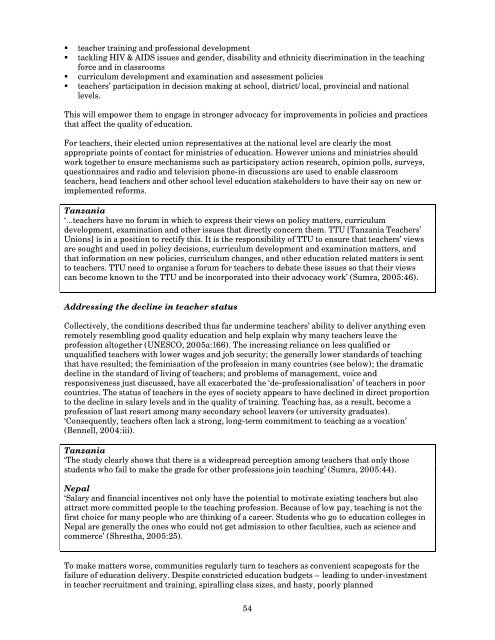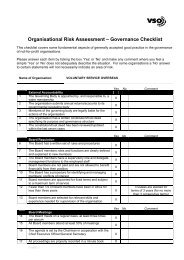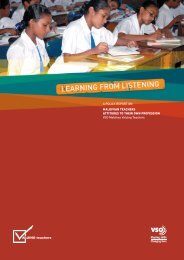Teachers for All â GCE policy briefing (566KB) - VSO
Teachers for All â GCE policy briefing (566KB) - VSO
Teachers for All â GCE policy briefing (566KB) - VSO
Create successful ePaper yourself
Turn your PDF publications into a flip-book with our unique Google optimized e-Paper software.
• teacher training and professional development• tackling HIV & AIDS issues and gender, disability and ethnicity discrimination in the teaching<strong>for</strong>ce and in classrooms• curriculum development and examination and assessment policies• teachers’ participation in decision making at school, district/local, provincial and nationallevels.This will empower them to engage in stronger advocacy <strong>for</strong> improvements in policies and practicesthat affect the quality of education.For teachers, their elected union representatives at the national level are clearly the mostappropriate points of contact <strong>for</strong> ministries of education. However unions and ministries shouldwork together to ensure mechanisms such as participatory action research, opinion polls, surveys,questionnaires and radio and television phone-in discussions are used to enable classroomteachers, head teachers and other school level education stakeholders to have their say on new orimplemented re<strong>for</strong>ms.Tanzania‘…teachers have no <strong>for</strong>um in which to express their views on <strong>policy</strong> matters, curriculumdevelopment, examination and other issues that directly concern them. TTU [Tanzania <strong>Teachers</strong>’Unions] is in a position to rectify this. It is the responsibility of TTU to ensure that teachers’ viewsare sought and used in <strong>policy</strong> decisions, curriculum development and examination matters, andthat in<strong>for</strong>mation on new policies, curriculum changes, and other education related matters is sentto teachers. TTU need to organise a <strong>for</strong>um <strong>for</strong> teachers to debate these issues so that their viewscan become known to the TTU and be incorporated into their advocacy work’ (Sumra, 2005:46).Addressing the decline in teacher statusCollectively, the conditions described thus far undermine teachers’ ability to deliver anything evenremotely resembling good quality education and help explain why many teachers leave theprofession altogether (UNESCO, 2005a:166). The increasing reliance on less qualified orunqualified teachers with lower wages and job security; the generally lower standards of teachingthat have resulted; the feminisation of the profession in many countries (see below); the dramaticdecline in the standard of living of teachers; and problems of management, voice andresponsiveness just discussed, have all exacerbated the ‘de-professionalisation’ of teachers in poorcountries. The status of teachers in the eyes of society appears to have declined in direct proportionto the decline in salary levels and in the quality of training. Teaching has, as a result, become aprofession of last resort among many secondary school leavers (or university graduates).‘Consequently, teachers often lack a strong, long-term commitment to teaching as a vocation’(Bennell, 2004:iii).Tanzania‘The study clearly shows that there is a widespread perception among teachers that only thosestudents who fail to make the grade <strong>for</strong> other professions join teaching’ (Sumra, 2005:44).Nepal‘Salary and financial incentives not only have the potential to motivate existing teachers but alsoattract more committed people to the teaching profession. Because of low pay, teaching is not thefirst choice <strong>for</strong> many people who are thinking of a career. Students who go to education colleges inNepal are generally the ones who could not get admission to other faculties, such as science andcommerce’ (Shrestha, 2005:25).To make matters worse, communities regularly turn to teachers as convenient scapegoats <strong>for</strong> thefailure of education delivery. Despite constricted education budgets – leading to under-investmentin teacher recruitment and training, spiralling class sizes, and hasty, poorly planned54
















